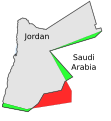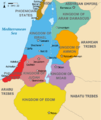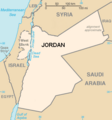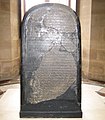The Jordan Portal  Jordan, officially the Hashemite Kingdom of Jordan, is a country in the Southern Levant region of West Asia. Jordan is bordered by Syria to the north, Iraq to the east, Saudi Arabia to the south, and Israel and the occupied Palestinian territories to the west. The Jordan River, flowing into the Dead Sea, is located along the country's western border. Jordan has a small coastline along the Red Sea in its southwest, separated by the Gulf of Aqaba from Egypt. Amman is the country's capital and largest city, as well as the most populous city in the Levant. Modern-day Jordan has been inhabited by humans since the Paleolithic period. Three kingdoms emerged in Transjordan at the end of the Bronze Age: Ammon, Moab and Edom. In the third century BC, the Arab Nabataeans established their kingdom centered in Petra. Later rulers of the Transjordan region include the Assyrian, Babylonian, Roman, Byzantine, Rashidun, Umayyad, Abbasid, and the Ottoman empires. After the 1916 Great Arab Revolt against the Ottomans during World War I, the greater Syria region was partitioned, leading to the establishment of the Emirate of Transjordan in 1921, which became a British protectorate. In 1946, the country gained independence and became officially known as the Hashemite Kingdom of Jordan. The country captured and annexed the West Bank during the 1948 Arab–Israeli War until it was occupied by Israel in 1967. Jordan renounced its claim to the territory to the Palestinians in 1988 and signed a peace treaty with Israel in 1994. Jordan is a semi-arid country, covering an area of 89,342 km2 (34,495 sq mi) with a population of 11.5 million, making it the eleventh-most populous Arab country. The dominant majority, or around 95% of the country's population, is Sunni Muslim, with the rest being mostly Arab Christian. Jordan was mostly unscathed by the violence that swept the region following the Arab Spring in 2010. From as early as 1948, Jordan has accepted refugees from multiple neighbouring countries in conflict. An estimated 2.1 million Palestinian refugees, most of whom hold Jordanian citizenship, as well as 1.4 million Syrian refugees, were residing in Jordan as of 2015. The kingdom is also a refuge for thousands of Christian Iraqis fleeing persecution. While Jordan continues to accept refugees, the large Syrian influx during the 2010s has placed substantial strain on national resources and infrastructure. The sovereign state is a constitutional monarchy, but the king holds wide executive and legislative powers. Jordan is a founding member of the Arab League and the Organisation of Islamic Cooperation. The country has a high Human Development Index, ranking 99th, and is considered a lower middle income economy. The Jordanian economy, one of the smallest economies in the region, is attractive to foreign investors based upon a skilled workforce. The country is a major tourist destination, also attracting medical tourism with its well-developed health sector. Nonetheless, a lack of natural resources, large flow of refugees, and regional turmoil have hampered economic growth. (Full article...) Selected article -The Jordan River or River Jordan (Arabic: نَهْر الْأُرْدُنّ, Nahr al-ʾUrdunn; Hebrew: נְהַר הַיַּרְדֵּן, Nəhar hayYardēn), also known as Nahr Al-Sharieat (Arabic: نهر الشريعة), is a 251-kilometre-long (156 mi) river in the Levant that flows roughly north to south through the Sea of Galilee and drains to the Dead Sea. The river passes by or through Jordan, Syria, Israel, and the Palestinian territories. Jordan and the Israeli-occupied Golan Heights border the river to the east, while Israel and the Israeli-occupied West Bank lie to its west. Both Jordan and the West Bank derive their names in relation to the river. The river holds major significance in Judaism and Christianity. According to the Bible, the Israelites crossed it into the Promised Land and Jesus of Nazareth was baptized by John the Baptist in it. (Full article...) Selected biography -Marouf Suleiman al-Bakhit (Arabic: معروف البخيت; 18 March 1947 – 7 October 2023) was a Jordanian politician who was twice prime minister. He first served as prime minister from 27 November 2005 until 25 November 2007 and then again from 9 February 2011 to 17 October 2011. Bakhit also held the position of Jordanian ambassador to Israel and the national security chief. Appointed prime minister by King Abdullah II less than three weeks after the 2005 Amman bombings, Bakhit's main priorities were to maintain security and stability in Jordan. He was reappointed prime minister by the King on 1 February 2011, following weeks of protests. Al-Bakhit resigned from his post on 17 October 2011, and was succeeded by Awn Shawkat Al-Khasawneh on 24 October. (Full article...) WikiProjectFor editor resources and to collaborate with other editors on improving Wikipedia's Jordan-related articles, see WikiProject Jordan. General images -The following are images from various Jordan-related articles on Wikipedia.
Selected city -Jerash (Arabic: جرش Ǧaraš; Greek: Γέρασα, romanized: Gérasa; Attic Greek: [gérasa], Koinē Greek: [ˈgerasa]) is a city in northern Jordan. The city is the administrative center of the Jerash Governorate, and has a population of 50,745 as of 2015. It is located 30.0 miles north of the capital city Amman. The earliest evidence of settlement in Jerash is in a Neolithic site known as Tal Abu Sowan, where rare human remains dating to around 7500 BC were uncovered. Jerash flourished during the Greek, Hellenistic, Roman, and Byzantine periods until the mid-eighth century CE, when the 749 Galilee earthquake destroyed large parts of it, while subsequent earthquakes contributed to additional destruction. However, in the year 1120, Zahir ad-Din Toghtekin, atabeg of Damascus ordered a garrison of forty men to build up a fort in an unknown site of the ruins of the ancient city, likely the highest spot of the city walls in the north-eastern hills. It was captured in 1121 by Baldwin II, King of Jerusalem, and utterly destroyed. Then, the Crusaders immediately abandoned Jerash and withdrew to Sakib (Seecip); the eastern border of the settlement. (Full article...)
See also: List of cities in Jordan
Related portalsReligions in Jordan Arab states Other countries Recognized content
Featured articlesGood articles
TopicsSelected topic overview -
CategoriesSelected picture - The Karak Castle (c. 12th century AD) built by the Crusaders, and later expanded under the Muslim Ayyubids and Mamluks.
Associated WikimediaThe following Wikimedia Foundation sister projects provide more on this subject:
SourcesDiscover Wikipedia using portals |

































































